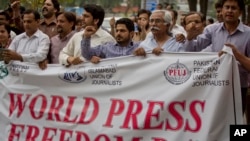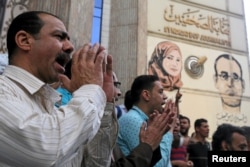A country without a free and independent press has nothing to brag about and nothing to teach the world, U.S. Secretary of State John Kerry said Tuesday.
Kerry spoke at the State Department to recognize World Press Freedom Day.
"No government, whatever its pretensions or whatever its accomplishments, can fairly claim respect if its citizens are not allowed to say what they believe or denied the right to learn about events or decisions that affect their lives," Kerry said.
He said the struggle between truth and outright lies is at the heart of a lot of the turbulence shaking the globe, including what is happening right now in Syria, Afghanistan, Ukraine, on the Korean Peninsula and in the South China Sea.
"You will see in all of those places ... a fundamental battle to define reality,” he said. “And you will see efforts by some people to invent out of whole cloth or to obscure the truth, the facts — to cover up events that did happen and make up stories about thing that didn't."
Reporting the truth is not a crime, but a badge of honor, Kerry said. He vowed that the U.S. will never stop speaking out in public and behind the scenes to defend the rights of the press and its members who have been threatened, abducted or unjustly imprisoned.
To that end, the U.S. will spend another $2.5 million this year on a program to provide digital and security training to more than 750 journalists around the globe.
On top of that, Kerry announced Tuesday a program to provide reporters in Southeast Asia who are likely to face "intimidation and violence" with the tools and technology to allow them to work safely.
Journalists under threat
"Journalists around the world, particularly in countries undergoing conflict and political repression, are under threat today like no other time in history," said Tom Malinowski, U.S. Assistant Secretary of State for Democracy, Human Rights and Labor.
In a VOA interview, he said more than 70 journalists were killed around the world last year while "doing their jobs," and nearly 200 were imprisoned.
"It is an epidemic that we would like to see diminished," he said.
Malinowski said journalists were often most vulnerable to unlawful detentions and other human rights abuses in countries that are in crises or in conflict.
He cited Syria, Yemen, Burundi, Turkey and Libya as examples of places that are especially dangerous for the press.
Seven cases are highlighted at HumanRights.gov and on Twitter using the hashtag #FreethePress.
China — Memetjan Abdulla: Editor for the Uyghur service of state-run China National Radio. Sentenced to life in prison in 2010 on charges of instigating ethnic riots in the Xinjian Uyghur Autonomous Region by posting on a Uyghur language website. But Radio Free Asia cited a witness at his trial who said Abdulla was jailed for briefing foreign journalists in Beijing about the riots and translating articles.
Cuba — Jose Antonio Torres: Journalist for official Communist daily, Granma. Arrested in 2011 after the newspaper published his report on government mismanagement. Received 14-year prison sentence for alleged spying.
Ethiopia — Woubishet Taye: Deputy editor-in-chief of Amharac-language Awramba Times. Found guilty on terrorism-related charges. A non-governmental organization said arrest followed a column he wrote critical of the ruling party.
Iran — Mohammad Sedigh Kaboudvand: Human rights activist and founder of weekly publication, Payam-e-Mardom, who has been in Evin prison since 2007. Charged with acting against national security and engaging in propaganda against the state, following reports on alleged torture in Iranian prisons and human rights abuses against Iranian Kurds
Russia — Sergei Reznik: Journalist, blogger. Imprisoned since 2013 after writing articles critical of municipal and regional authorities and local corruption and abuses. Unidentified men beat him with baseball bats and shot at him a month before conviction.
Sudan — Madeeha Abdallah: Editor-in-chief of El Midan newspaper. Arrested by security forces in 2015 for criticizing official policies. If convicted, could face death penalty for charges that include conspiracy, undermining constitutional order, and urging the opposition to use violence and force against government.
Uzbekistan — Muhammad Bekjanov: Jailed in 1999. Received additional five-year sentence shortly before scheduled release in 2012 for allegedly violating prison rules.





